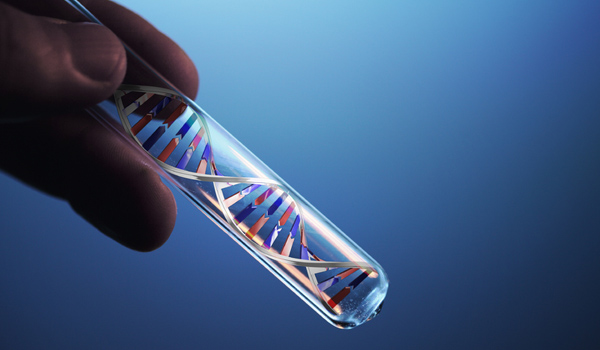Newborn Genetic Test Catches Rare Diseases Earlier

A new technology can diagnose rare genetic disorders in critically ill newborns within a few days, rather than the weeks that are needed with current methods, researchers say.
The technology involves sequencing the infant's genome, and then using new software to hone in on the genes most likely to be disease culprits.
In a new study, researchers identified the genetic cause of a newborn's illness in three out of four babies tested. The whole process takes about 50 hours, they said.
The speed of the new test is what could make it useful for sick babies in neonatal intensive care units (NICUs), the researchers said. Currently, it can take weeks for doctors to diagnose a genetic disorder in an ill infant, and many babies die before their test results are available, said study researcher Stephen Kingsmore, director of the Center for Pediatric Genomic Medicine at Children's Mercy Hospital in Kansas City.
A faster diagnosis for genetic conditions would allow doctors to provide earlier treatments — if there are any — or to give parents an earlier warning, and potentially more time together with their child, if the condition is untreatable and fatal, the researchers say.
Doctors already routinely screen newborns for a few genetic disorders that have effective treatments. But these tests look for single genes, rather than at the entire genome. There about 3,500 diseases known to be caused by mutations in a single gene, and 500 of these have some type of treatment available, Kingsmore said.
"By obtaining an interpreted genome in about two days, physicians can make practical use of diagnostic results to tailor treatments to individual infants and children," Kingsmore said.
Get the world’s most fascinating discoveries delivered straight to your inbox.
However, critics point out that the diseases identified by new technology are rare, and extra genetic information is not always helpful. In fact, some are worried the genetic testing could deliver more information than researchers know what to do with.
Diagnosing genetic diseases
To begin a diagnosis with the new technology, the researchers take a drop of the baby's blood so that his or her genome can be sequenced.
Next, a physician enters the patient's symptoms into a software program. The program scans the newborn's genome looking for genes that are likely to cause such symptoms.
The program identifies only diseases that are caused by a single genetic mutation. The researchers tested their program on 500 cases of children who had already been diagnosed, and found it was more than 99 percent accurate in finding the correct gene mutation that was causing the patient's symptoms.
The researchers also tested the technology on four NICU babies who had not yet been diagnosed with a condition. In one case, the researchers quickly identified a gene that causes epilepsy. Because the gene has been reported in only a few people in the world, "it would never have been on any physician’s radar," said Carol Saunders, director of the molecular genetics laboratory at Children's Mercy.
No treatments were available to help the child, and the condition was fatal. However, the parents can now undergo genetic testing to determine how likely it is they will have another child with the disease.
In a second newborn, the researchers found a new gene they believe causes heterotaxy, a condition in which some of the internal organs are on the wrong side of the body.
The testing is not always perfect. In the case of a newborn who died, the researchers were not able to identify the cause of death. They hope their testing will improve as they gather more information to add to the program.
Criticism
While the new technology gives physicians another diagnostic tool, current newborn screening tests reveal most of the cases in which children would benefit from early treatment, said Dr. Jennifer Kwon, an associate professor of neurology and pediatrics at the University of Rochester Medical Center.
"I don't know that we're going to find as many cases where the rapid diagnoses lead to changes in management and treatment as the authors suggest." Kwon said.
"In addition, some of these diseases are so rare that we still do not understand the effects of a particular mutation or combination of mutations. A certain mutation may be seen in a very sick child and the same mutation may be seen in a child who is doing relatively well," Kwon said.
Kwon pointed to a genetic condition called Krabbe disease, for which all newborns born in New York are routinely screened. Although fatal in some, the disease can be treated with a bone marrow transplant.
In the six years that the testing has been done, the state has seen five cases of children who would benefit from the bone marrow transplant, and 30 children who have the mutation and don't appear to be ill.
Kwon said she does not know whether these children will become ill at some point, and cannot tell parents what to expect. The new technology could create a large-scale version of this anxious situation, Kwon said.
The study is published today (Oct. 3) in the journal Science Translational Medicine.
Pass it on: A new technology can quickly identify rare genetic diseases in critically ill newborns.
This story was provided by MyHealthNewsDaily, a sister site to LiveScience. Follow Rachael Rettner on Twitter @RachaelRettner, or MyHealthNewsDaily @MyHealth_MHND. We're also on Facebook & Google+.

Rachael is a Live Science contributor, and was a former channel editor and senior writer for Live Science between 2010 and 2022. She has a master's degree in journalism from New York University's Science, Health and Environmental Reporting Program. She also holds a B.S. in molecular biology and an M.S. in biology from the University of California, San Diego. Her work has appeared in Scienceline, The Washington Post and Scientific American.


